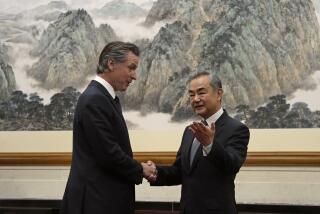China’s Citrus Business Could Mean Big Slice for Sunkist
- Share via
All eyes are on China these days at Sunkist Growers, where “PNTR” has become the buzz phrase of the moment.
The letters--which stand for Permanent Normal Trade Relations--roll off the tongues of top company brass as smoothly as the droplets of juice that have made the Sherman Oaks-based cooperative practically synonymous with oranges and fruit juice.
China could soon become a fertile market for Sunkist oranges, lemons and grapefruit after the world’s most populous nation recently resumed importing U. S. citrus for the first time since the fruit fly scare of the early 1980s.
The inaugural China-bound shipment of 1,080 cartons of Sunkist fruit left Long Beach amid fanfare March 24 and reached the port of Dalian on April 17. A few orders have been placed since then, and more shipments were sent in mid-April.
Sunkist estimates that exports to China could be worth as much as $500 million over the next five years, Chief Executive Vince Lupinacci said.
“China’s a great market,” he said. “You’re talking 1.3 billion in population and about 20% of the population can afford to buy citrus like oranges. That’s a population about the size of the U. S.”
Indeed, the $500 million in sales, if realized, would make China one of Sunkist’s largest overseas markets. By comparison, Sunkist shipped $138.7 million worth of exports to Japan--its largest export market--in 1999, followed by $27.7 million worth to Hong Kong and $15.7 million worth to Malaysia and Singapore.
About two-thirds of Sunkist sales are now domestic, with most of the remainder going to Asia.
The cooperative exports virtually no fresh fruit to Europe, where high tariffs make Sunkist citrus noncompetitive with fruit grown in Spain and other Mediterranean countries, according to Lupinacci.
China could prove a bonanza for Sunkist, but the bold sales predictions also could be scuttled if Congress fails to approve PNTR in upcoming votes, according to citrus experts.
Many agree that China--even if it doesn’t renege outright on its market-opening moves--will likely take more covert steps to stop U. S. citrus exports if PNTR is not approved for China.
In that event, Congress would need to renew normal trade relations, formerly known as “most favored nation” status, for China each year.
PNTR is expected to pass in the U. S. Senate, but the vote will be much closer in the House of Representatives, according to Lupinacci. Ironically, one strong opponent of PNTR is Rep. Brad Sherman (D-Sherman Oaks), who represents Sunkist’s district and lives just down the street from its Riverside Drive headquarters.
“Maybe Sunkist will be able to sell a few oranges for a few years,” Sherman said. “But then [the Chinese] will come back to Sunkist in a few years and say, ‘We’re going to turn off access to your market if your government keeps selling weapons to Taiwan.’ How many times will the Communist Party be able to say to Sunkist, ‘We’re going to turn off access to our markets if you don’t give us something else’?”
At home and abroad, Sunkist acts mostly as a marketing and distribution agent for its 6,500 California and Arizona members, returning all proceeds from sales to the farmers after expenses are paid. The cooperative accomplishes its task through a system of regional and worldwide offices, and a staff of about 400 at its Sherman Oaks headquarters.
The China debate has brought a number of Sunkist growers into the fray, including longtime orchard owner Monty Winkler. Located in a rural area of Ventura County about 20 miles south of Fillmore, Winkler’s orchard of about 27,000 orange and lemon trees hardly seems to be at the center of a political storm being fought on both coasts.
But the 67-year-old farmer, whose grandfather joined Sunkist not long after its inception in 1893, has contacted his congressman, Rep. Elton Gallegly (R-Simi Valley), to express his concerns.
“We’re talking to our congressman and our senators,” he said. “We’re trying to convince them they should vote for permanent trade recognition for China. China’s going to be a wonderful market for us.”
In fact, Sunkist has been shipping citrus to China for years, mostly smuggled through Hong Kong, said Greg Partida, fruit industries coordinator at Cal Poly Pomona, which operates Los Angeles County’s only remaining commercial citrus orchard on about 65 acres.
“I’m sure they’re going to be one of the dominant companies in there because of the experiences they’ve had in the Orient as a cooperative,” Partida said. “I think they have a head start on it.”
Lupinacci acknowledged that Sunkist fruit made its way into China in the past via Hong Kong, but said legal imports should knock the price down significantly from the current level of about $2 per navel orange.
“It could be $1 or less, depending how aggressive retailers want to be,” he said. “It really is going to be a function of how the retailer handles it, what margin they’re looking for.
“We’re very much a proponent of permanent normal trade relations with China.”
More to Read
Inside the business of entertainment
The Wide Shot brings you news, analysis and insights on everything from streaming wars to production — and what it all means for the future.
You may occasionally receive promotional content from the Los Angeles Times.










